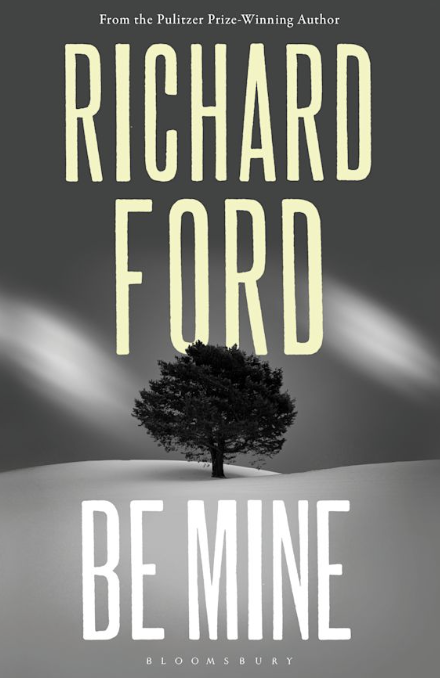Review: Be Mine, Richard Ford, Bloomsbury
The American Declaration of Independence famously lists ‘life, liberty and the pursuit of happiness’ as keys to the nation’s founding. Richard Ford’s literary creation, Frank Bascombe, the protagonist of his series of novels (including one titled Independence Day), is a kind of American boomer everyman philosopher, interested in what constitutes happiness. Questions of what makes one happy are there right at the start of the first novel, The Sportswriter, written nearly forty years ago, and they permeate the latest, Be Mine.
In this latest novel, Frank, a sports journalist turned real estate agent, is in his mid-seventies, and you might think that, at this age, an approaching end of life might prompt him to ask about happiness and what makes for a ‘good’ life, but this latest novel centres on the approaching end of life of his adult son Paul, who has a form of MND. The deaths of his sons bookend the series, in fact. At the start of The Sportswriter, Frank is meeting his ex-wife at his son Ralph’s grave.
At the graveside Frank reads – or tries to – from a poem about the beauty of mundane things, and Frank is often found meditating on how it is the ordinary that makes for a good life. It’s as if the big events turn out to be the unhappy ones, and the book is about going with the flow when life gives you the unexpected. In The Sportswriter Frank says more than once that causality is a difficult thing to work out, and he implies that it is better for one’s outlook on life to not try to work it out. This could be realism – or avoidance or apathy. It’s easy to sink into Frank’s point of view, but whether you actually agree with it is another thing altogether.

Frank is certainly in the unexpected position, as sometimes happens in life, of becoming a caregiver for his son. Paul is an odd character, crude and weird, portrayed with dark humour, sliding sarcastically into his illness, trading insults and jokes with his father, a literary character Ford has seemingly amplified for good effect. But the book is not about meeting death with dignity, or about love conquering all, and perhaps there is more realism in Paul not being the stoic patient. He angrily dismisses the idea of leaving a ‘legacy’ for medical science. Meaning is wrestled from his life on a day-to-day basis, which you do when you have a terminal disease, and also, often, when you don’t.
The first half of the book is a sort of summing-up since the last novel, largely about Frank’s sudden proximity to his son, with an aborted trip to the movies and campervan shopping – noir humour. The second half features, as in Independence Day, a road trip, this time to see Mount Rushmore, the journey being as much an iconic American thing as the kitschy patriotic destination. (Indeed, I recall The Lay of the Land having a lot of driving in it, merely around the suburbs, during which Frank gives us his outlook on life, which seems apt, considering the American love of cars.) As with the other novels, the action, such that it is, takes place around a festive day, in this case Valentine’s Day, which provides the book’s title. Frank has a new, semi-romantic relationship (I won’t go into that), but it could just be that the title also refers obliquely to the new responsibility Frank has for his son. An old flame says that Frank never cared much for the day itself anyway. Frank and Paul exchange cards jokingly, but there is a deeper context.
In the Bascombe novels, what might be at the periphery of some American novels is in the centre (and vice versa). They are about the setting of American life as much as what happens in it. Frank is the observer, and commentator, appropriately for a sports journalist, and unsurprisingly for a real estate agent, he ties happiness to place. He appraises the suburbs affirmatively, extolling the virtues of introverted New Jersey suburbia, and in Minnesota, where he takes his son to the famous Mayo medical clinic, he finds more suburbia he would be happy to live in. Suburbia is the place where you just take life as it comes. His summing up of the attributes of various places may suggest a God’s-eye-view, but he cautions against this, as understanding is, he thinks, a moving, contingent thing.
At one point Frank observes that what most of us do from one day to the next makes little difference to the wider world. Maybe this is in opposition to an American obsession with fame, and a sly undermining of the role of the novelist, which is to say something of importance. (Frank traded in novel-writing for sports journalism.) In The Sportswriter he describes himself as a (bad) Presbyterian who privileges works over faith, and there is a bemused matter-of-factness about his caring for his son, as there is about most aspects of his life. Of course, being a caregiver to your dying son does make a difference, but Frank’s droll observation of that is that if he wasn’t his son’s caregiver, he would be just filling in time doing some other thing anyway, and he takes from it what happiness he can.
Nick Mattiske blogs on books at coburgreviewofbooks.wordpress.com and is the illustrator of Thoughts That Feel So Big.












